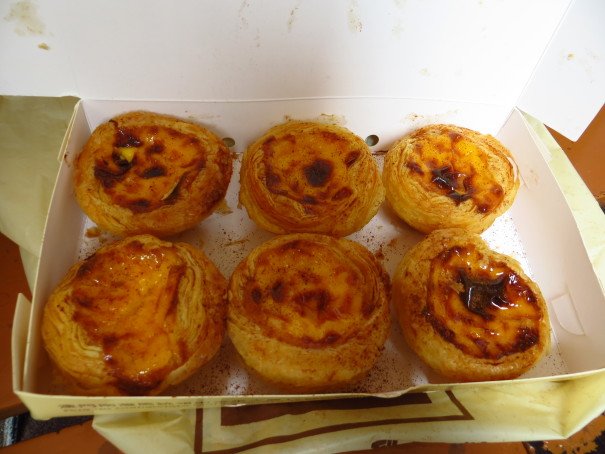
The Only Decent Dessert in China

The Only Decent Dessert in China
Dan Ta in Macau
Chinese desserts are, as a rule, atrocities. This is a matter of established fact. The country is full of bakeries, and every last one of them sells the same things: oil-soaked pastries stuffed with an industrial byproduct known as “meat floss”; a vast range of beautiful-looking golden buns that by any reasonable standard should contain chocolate or, at least, jam, but which in reality conceal the same gritty, sweet, red bean paste that tastes like chewing tobacco; and a range of gaily-colored, elaborately-sculpted cakes decked with marzipan mice or Bart Simpsons, each of which looks delicious and tastes like air, being as it is made out of nothing but vacuum-packed sponge cake, food coloring, and deceit.
And yet, in the darkness, a solitary candle gleams: the humble egg tart, or dan ta. A perfect little disc of yellow custard embraced by flaky crust, it is invariably the most edible thing in a Chinese bakery (KFC, strangely enough, makes them impressively well). I adore these things. Why are they so good? Because they’re Portuguese. They arrived in Macau, a tiny colony at the very southern tip of China, sometime in the mid-1800s. Known in their native Portugal as pastels de nata, they are among the only foreign foods that have been completely absorbed into the Chinese culinary tradition. On a recent trip to China, I finally managed to visit their source.
Macau is like a buoy that has been knocked around by the waves of history for hundreds of years, but just keeps right on bobbing along. Strictly speaking, I was there to research a novel I’ve set there, a joint project between myself and a good friend who knows the island cold. It’s an hour from Hong Kong by ferry. Settled by the Portuguese as a trading port in the mid-1500s, it became a formal colony in 1887, and was finally handed over to the Chinese government in 1999, two years after Hong Kong. With 600,000 people living in a territory of just a dozen square miles (about a third the size of Manhattan), it is one of the most densely populated regions in the world. But that, of course, is not what it’s known for.
Macau’s gambling revenue is five times that of Las Vegas. The city—once a sleepy, humid port full of cheerful, pastel-colored Portuguese architecture—is now a canyon of towering casinos of bronze-colored glass. Its streets are lined not with cafés and restaurants but with endless empty pawn shops or cognac-and-dried-sea-cucumber shops, where at all hours three or four white-shirted employees sleep behind the counter (many of these are just money-laundering fronts). It’s ugly. It’s expensive. It’s hot as hell, even at night. It’s a perfect place to set a novel, if you want that novel to be about corruption, greed, and depravity (and I do). But even the corrupt, even the depraved, must be human. And finding the humanity in Macau was a tall order until, on my first morning in the city, my writing partner took me to Margaret’s Café e Nata for breakfast.
Margaret’s is an outdoor café in a steamy alley in the shadow of the Grand Lisboa, the first (and still weirdest) casino in Macau, whose tower is supposed to resemble a lotus flower but looks more like a sprig of barbed wire. The alley is alive with the drone of the hundred air-conditioning units that stud the walls of the surrounding building. There is only outdoor seating on little wooden stools. We ordered six egg tarts. It turned out, though, that all I needed was one bite.
The book is simple, in theory. Orval de Figueroa, a fat old wistful Portuguese lawyer, is wracked with debt and must leave Lisbon, so he moves to Macau, where he believes he can still have his espresso and his egg tarts and be left in peace. Things do not go as planned. For months, I had been hacking at this novel, combing Google street view and talking things over with my writing partner, and I simply couldn’t get at the heart of the book. I couldn’t even really picture Orval, couldn’t grasp what moved him—until I took my first bite of Margaret’s dan ta.
The crisp warm shell was fragile as a swallow’s nest. The difference between the flimsy yellow versions flogged in mainland China and this, the real deal, was the difference between Hello Kitty and an actual cat purring and sleeping in your lap. Here, we were provided with cinnamon with which to dust our tarts and sting the nostrils; here, the custard was deep, rich, tenderly blistered on the surface, then soft and opulent on the tongue. It was like a Proustian madeleine, but instead of unfurling the past, it flung open the door to the entire book. I knew clearly what kind of man would leave his home and leave his family in search of these things. I could see him plainly, thick stubby fingers holding the tart ever so gently, as if it were a communion wafer. Closing his eyes as he passed it under his nose, drawing in the scent. Piece by piece he came together, hands, eyes, nose, belly, until finally Orval de Figueroa stood before us fully formed—revealed by the oracular pastry. Our main character lived at last.